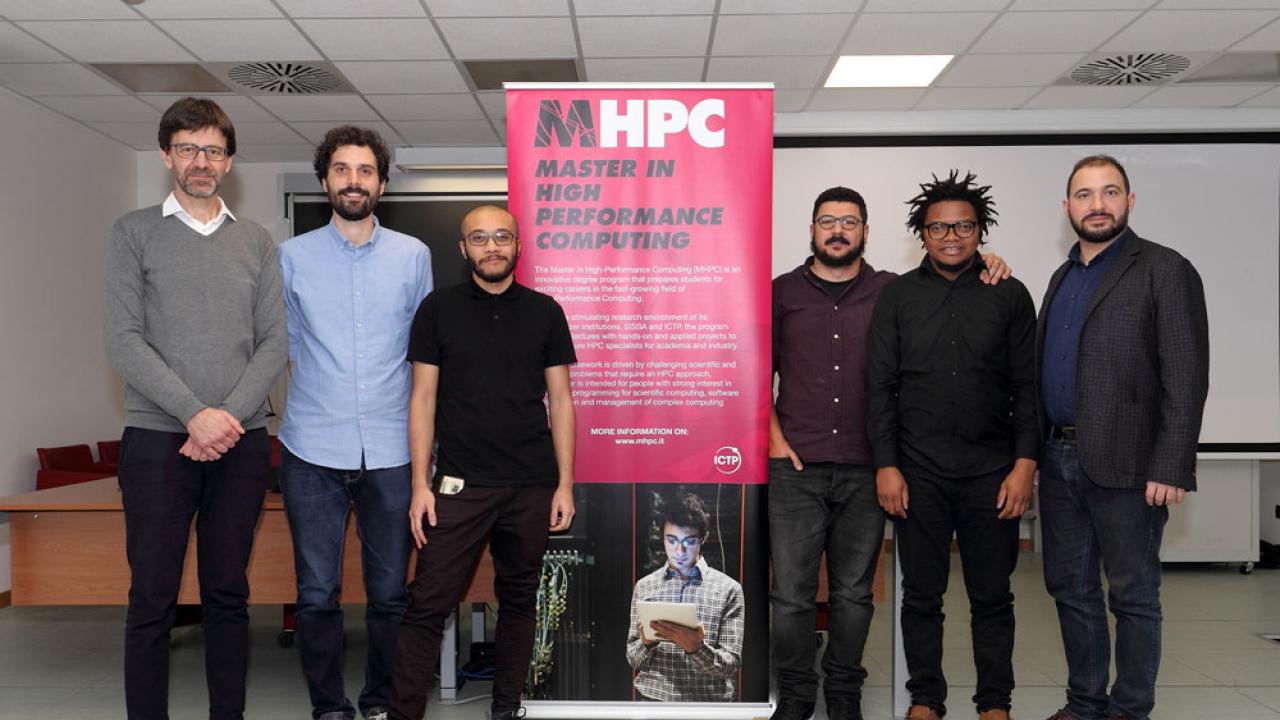
Twelve students of the joint ICTP-SISSA programme in High Performance Computing (MHPC) graduated last week after a year and a half of intense studies and thesis preparation. ICTP’s support has been once again crucial for the presence of four students from developing countries among the graduating class:
- Federico Barone (Argentina)
- Herbert Nguruwe (Zimbabwe)
- Florentino Silva (Brazil)
- Jesús Espinoza Valverde (Costa Rica)
A graduation ceremony was held on Friday 14 February at SISSA; it included a keynote lecture by Federico Toschi, full professor at Eindhoven University of Technology (TU/e). The event focused on analysing new HPC trends and needs, in order to promote dialogue and foster collaboration between scientific institutions, political stakeholders and society.
The MHPC offers a curriculum designed to prepare students for the scientific and technical challenges of the rapidly growing field of high-performance computing. MHPC students have the advantage of pursuing their degrees in the stimulating research environment of ICTP and SISSA, where they work in close cooperation with leading research groups.
The programme combines lectures by highly recognized international experts from academia and industry with practical projects. This application-oriented approach, as well as the diversity of the instructors' backgrounds, prepares future HPC specialists to address problems requiring advanced computational techniques in multiple domains.
For crucial support in the coding required to integrate their research with the use of high-performance computers, the students worked closely with Ivan Girotto, ICTP's HPC applications specialist. “The MHPC has a rather demanding programme, where selected students from developing countries peer with students from Italy and the European Union,” said Girotto. “The effort required is significant but ICTP’s support makes it possible for the students to complete the programme successfully.”
Of the students supported by ICTP, Federico Barone of Argentina earned recognition for having the best thesis among all of this year’s graduates, and presented his work during the ceremony.
Barone collaborated with CRO Aviano, the oncological research centre of Friuli Venezia Giulia, and Professor Alessandro Laio of SISSA. He addressed the problem of storage in medical imaging, in particular mammograms, using a compression algorithm based on neuronal networks. “Aside from all the technical and programming tools that the master's programme offers,” said Barone, “I really appreciated its philosophy of applying HPC tools to real-life scientific problems, the mentality to produce algorithms that can be applied to research.”
Barone also values the quality of the courses and of the instructors. “What surprised me at first, and what I really enjoyed,” he added, “is the fact that you can experience a one-to-one relationship with the professors. This is really great for learning.”
Herbert Nguruwe, a graduate from Zimbabwe, has also made the most of this experience and is now working in ICTP's Information and Communication Technology Section as an HPC system administrator. Before enrolling in the MHPC programme, he was working at the HPC facility at University of Cape Town (UCT) in South Africa. The master's programme changed his perspective on how to solve the problems that emerge in the administration process. “I am now able to understand how the user actually uses HPC,” Nguruwe said. “I can actually programme, I can actually solve the code, and I have a better understanding of how to manage the system and solve problems more efficiently than before.”
The diversity among the students is a key strength of this programme, as well as the quality of its courses. “My favourite part of the master was getting to know people from different perspectives and with different backgrounds,” added Nguruwe. “When there is a common project, you forget about all the differences and just start working together, everybody helps each other and this was really crucial for getting where we are now.”
---- Marina Menga
















